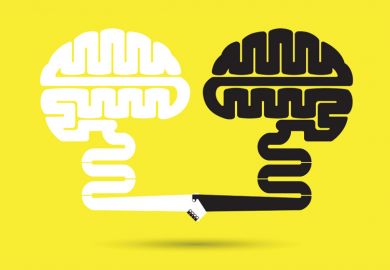The UK government’s Department for Business, Energy and Industrial Strategy has confirmed that Sir Mark Walport – currently the government’s chief scientific adviser – will become the first chief executive officer of UK Research and Innovation (UKRI), the new research and innovation funding organisation being established by the Higher Education and Research Bill. Here, he writes about his ambitions for his tenure.
The Industrial Revolution of the 18th and 19th centuries was driven by a community of scientists, engineers and entrepreneurs. They were liberated by the Enlightenment, an age of science, engineering, reason and philosophical enquiry.
At the heart of the Industrial Revolution was the steam that drove the industrial engines of the 18th and 19th centuries. Steam continues to drive the turbines in many of the power stations that generate the electricity on which we completely depend. But it is steam of a different sort that is powering the industrial revolution of the 21st century – STEAM in the form of science, technology, engineering, arts and mathematics.
Since the start of the Enlightenment, the UK has been a scientific world leader.
What is the recipe for this today? Our universities are foremost among the ingredients. They bring together the brightest minds, freedom of enquiry and vital resources. They provide education that is inspired by research. They engage with the outside world, with business and industry, with local communities, cities and regions, and the world at large. They exchange a heady mix of staff and ideas, collaboration and competition.
Furthermore, the UK has world-leading research institutes, such as the MRC Laboratory for Molecular Biology in Cambridge.
We are a world leader in the application of our research. In medicine we invented medical ultrasound, CT and MRI scanners, discovered how to make monoclonal antibodies and how to sequence DNA. We invented the steam engine and the jet engine. The modern computer was born in the minds of mathematicians and created by engineers from Charles Babbage to Alan Turing and Tommy Flowers.
The impact of anthropological studies funded by the UK’s Arts and Humanities Research Council in tackling Ebola highlighted that social sciences and humanities are essential to informed policy development and delivery.
Just as important is the innovation led by our business community. We know that industrial research is a central ingredient for the success of companies large and small, many of which employ outstanding scientists, engineers and technologists and work in close partnerships with UK universities. Our pharmaceutical, aerospace and burgeoning technology sectors show that we are outstanding at innovation, turning knowledge and ideas into products and services.
Many of our world-class creative arts businesses combine art, design and technology, from the cutting edges of the performing arts to the computer gaming industry. We must continue to capitalise on our strengths, making the most of business opportunities emerging from investments in areas such as robotics, clean energy and biotechnology.
Neither research nor innovation can happen without money, public and private. So another ingredient for our success is our public funding agencies: the seven research councils – created more than a century ago, starting with the Medical Research Council – alongside our innovation funding agency, Innovate UK.
And yet another ingredient is our dual-support system, which gives universities the strategic capability to direct some of their funds to support new areas of scholarship, and to support the shared infrastructure necessary for a successful academic endeavour. But with all of these ingredients, why mess around with a system that is so successful?
The answer is that we need to continue to raise our game. The world is getting the hang of the idea that research and innovation are crucial to economic growth – and many nations are putting their money where their mouth is.
We cannot sit on our laurels, or even our Nobel prizes. Research and innovation funding is still largely delivered by organisations siloed in traditional disciplines, allowing some imaginative proposals to fall between the cracks. Solving many of the most important fundamental research questions and tackling the challenges facing society requires an interdisciplinary approach.
A review of the research councils once concluded:
“Whatever organisation is ultimately adopted to manage basic and strategic research it should be one that unifies rather than fragments scientific activity, one in which the determination of the scientific programmes is in the hands of scientists and one which retains a close association with the education and training of scientists of the future. In our view it is illogical on the one hand to assert the unity of science and the fluidity of its internal boundaries, and on the other hand to approve a system of completely independent Research Councils, each of which can only operate within relatively rigid boundaries set by its individual charter.”
These words were published in 1971 by Sir Frederick Dainton. They were strongly echoed in Sir Paul Nurse’s report, which has led the government to create UK Research and Innovation (UKRI) through the Higher Education and Research Bill. The government has also put its money where its mouth is with the announcement in the 2015 Autumn Statement of £4.7 billion of new R&D funding between now and 2021.
Subject to Parliament, UKRI will bring together under a single umbrella the seven research councils, Innovate UK and a new organisation, Research England, working closely with its partner organisations in the devolved administrations.
The ambition is simple. In her recent Lancaster House speech, the prime minister stated her desire that Britain should be one of the best places in the world for research and innovation. UKRI will help to ensure that the UK maintains this position by creating a research funding system greater than the sum of its parts.
It will provide a coherent voice for research and innovation. It will deliver greater focus on multi- and interdisciplinary research. It will provide a more strategic and agile approach to future challenges. It will achieve this by working closely with all of the communities for whom it is vital that UK research and innovation continues to be an outstanding success. Watch this space.
Sir Mark Walport is chief executive designate of UKRI (UK Research and Innovation).
POSTSCRIPT:
Print headline: Why a shake-up of UK research funding is needed
Register to continue
Why register?
- Registration is free and only takes a moment
- Once registered, you can read 3 articles a month
- Sign up for our newsletter
Subscribe
Or subscribe for unlimited access to:
- Unlimited access to news, views, insights & reviews
- Digital editions
- Digital access to THE’s university and college rankings analysis
Already registered or a current subscriber?





